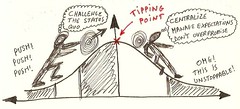I blogged last week about the KM culture shift. We must also beware of the risk of shift-back.
Implementing Knowledge Management is largely about culture change. As described last week, this is the change from seeing knowledge as personal property, to seeing knowledge as something collective; something we can all benefit from, and contribute to. The early stages of KM implementation are all about testing and piloting the new approach, and publicising this until you reach the tipping point.
The tipping point seems to come when 10% of the people have made the change and are committed to the new culture (other studies suggest the tipping point may be 30% - certainly 10% seems a low figure). When enough people m ake the change, and enough other people see this happening, then the culture change becomes self-propagating.
However there is an anti-tipping point, or a "shift-back" point.
I am sure we have all seen companies make great strides in KM, fail to embed it, and then see all their hard work unravel as the organisation "tips back" to its previous state.
I suspect this tipping back point comes when 10% (or 30%) of the people refuse to do KM (however KM is defined by the organisation), and enough other people see them getting away with this. They see a significant chunk of the organisation refusing to play the game, without any comeback. That's when they realise that KM is optional after all, and that they themselves need not bother either. Once you have reached this point, your cause is lost, and the culture tips back.





No comments:
Post a Comment